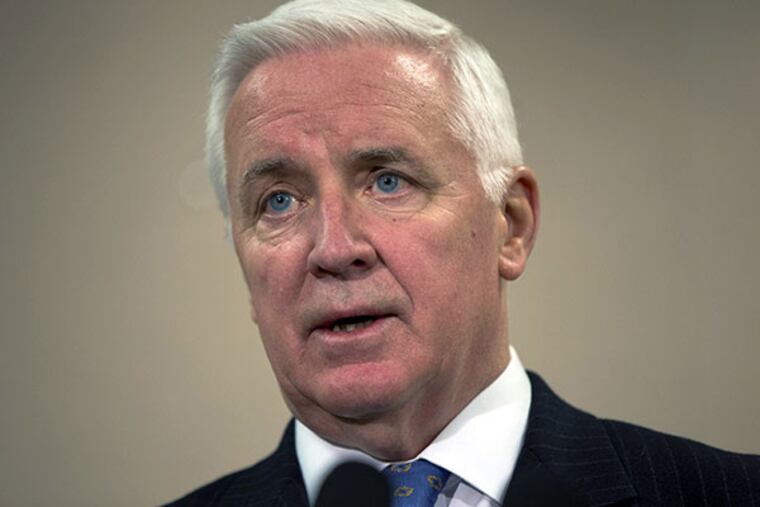How Corbett reached decision not to appeal same-sex marriage ruling
HARRISBURG - When word spread late Monday that a federal judge was poised to issue his long-awaited opinion on the constitutionality of Pennsylvania's same-sex marriage ban, Gov. Corbett sensed what it would say.

HARRISBURG - When word spread late Monday that a federal judge was poised to issue his long-awaited opinion on the constitutionality of Pennsylvania's same-sex marriage ban, Gov. Corbett sensed what it would say.
Given rulings in other states, the Corbett administration expected U.S. District Judge John E. Jones III would strike down the state's 1996 law defining marriage as between men and women, according to sources close to the governor.
The bigger question was how, and how quickly, Corbett would respond.
Jones' ruling came down Tuesday as Corbett was preparing to be renominated for governor. After his primary-night party in Pittsburgh, aides said, he took home the 39-page decision and read it several times, then woke up at 4:30 a.m. wrestling with how to proceed.
The next afternoon - almost exactly 24 hours after Jones' decision - the usually deliberative governor announced his own conclusion, surprising advocates on both sides of the highly charged issue:
Corbett would not appeal.
Was the lightning-fast decision an acknowledgment of the political reality of pursuing an appeal?
Or was it based on the realities of rulings in courtrooms elsewhere, where judges in six states had overturned similar laws since the Pennsylvania marriage suit was filed last July?
Corbett declined to be interviewed on the topic. And his closest aides were reluctant to go much beyond what the governor himself said in a short statement Wednesday.
"The governor personally struggled immensely with this decision," said Corbett's chief of staff, Leslie Gromis Baker. "Prior to the opinion being released, the governor was conflicted between his personal and religious beliefs based on his Catholic upbringing and teachings, and the legal arguments that were made in Judge Jones' opinion."
But Corbett clearly faced both political pressure and legal precedent in the run-up and immediately after the decision. And observers are mixed about how his own choice might ripple during the election year for a governor whom pundits have dubbed the most vulnerable incumbent nationwide.
Vic Walczak, legal director for the ACLU of Pennsylvania, one of the lawyers for the plaintiffs before Jones, had been certain the case was headed to the U.S. Supreme Court.
"I absolutely figured there would be an appeal," he said late last week. "I never imagined it would stop here."
Lobbyists on both sides of the issue said they went to work Tuesday to press their case with Corbett.
Ted Martin, executive director of Equality PA, an LGBT advocacy organization, said his group reached out to Corbett through its Republican-lobbying firm Buchanan Ingersoll, and urged the governor not to appeal.
"We made our point of view known to the governor's office," he said.
Meanwhile, groups opposed to same-sex marriage, including the Pennsylvania Catholic Conference, also made their feelings known.
Even the governor's advisers were split, with some believing that not appealing would anger conservative Republicans and be perceived as pandering as Corbett faces a difficult reelection battle in the fall.
What clinched the decision for Corbett, the advisers said, was the judge's use of a legal concept called "heightened scrutiny" in assessing the claims of same-sex couples in the lawsuit.
The plaintiffs argued they were being denied equal protection under the Constitution and by applying heightened scrutiny the administration would have to make a stronger case to justify the ban - arguments Corbett thought would be inflammatory and degrading to gays and lesbians.
"Not only would the record not support the argument we would have to make as it applies to heightened scrutiny, but it flies in the face of dignity and compassion," said Corbett's chief counsel, Jim Schultz.
And though some critics contend the decision was political, Corbett's closest aides said they do not believe he gains any political advantage from this.
"He didn't do this so people can think he's a good guy," said one person close to Corbett who asked to remain anonymous discussing the internal workings of the administration. "I don't think anyone will tell you this will translate into hundreds of thousands of votes."
Still, conservative Republicans are angry - and this decision alone will likely not be enough to galvanize the moderate Republicans and independent voters Corbett needs to win in November.
"He's stuck between the proverbial 'rock and a hard place,' " said Chris Borick, professor and pollster at Muhlenberg College. "This was the last thing he needs given his already tenuous standing with the public."
Borick said Corbett tried to find a nuanced response - saying that as a Roman Catholic he personally believes marriage is between a man and a woman - while acknowledging the unlikelihood of success in the courts.
But how many people might that sway?
"He's got a growing problem with the base questioning his authenticity as a Republican," Borick said. "For someone constantly putting out brushfires, this decision will have political fallout because voters - particularly social conservatives - have passion about this issue."
But Terry Madonna, political analyst and pollster from Franklin and Marshall College, said Corbett's decision on gay marriage - just as his decision this month not to appeal a decision striking down the state's voter ID law - removes another wedge issue from the campaign.
"Voter ID and gay marriage are clarion calls for activism and energy - and he's taken cultural hot-button issues off the table," Madonna said. "Now he needs low Democratic turnout and a chance to energize the base and win moderate voters. If you asked me if he's stronger or weaker, I'd say he's stronger now."
717-783-2584 @inkyamy